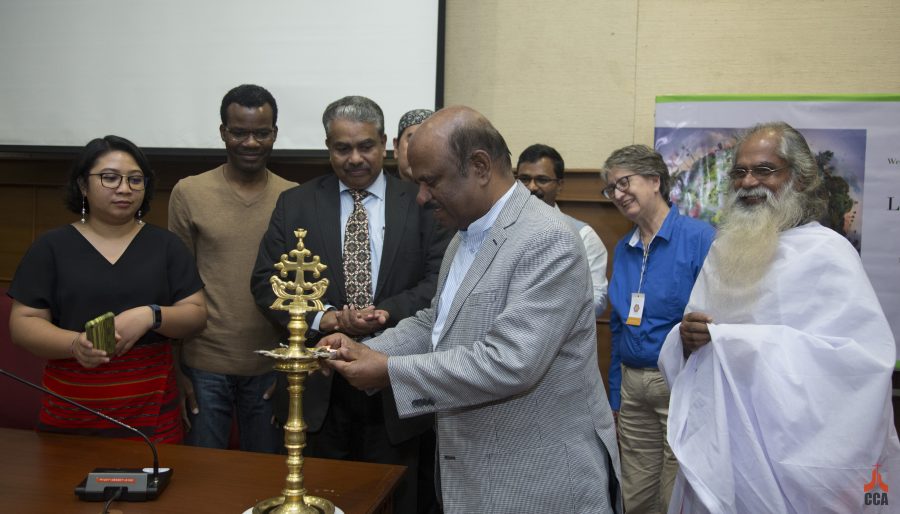“Only an ecologically sustainable world can ensure harmonious co-existence amidst all God’s creation,” says CCA General Secretary at the opening of Eco-School- 2019
 Eco-School commences with traditional lamp-lighting ceremony
Eco-School commences with traditional lamp-lighting ceremony
CHIANG MAI, Thailand: Eco-School 2019 was opened after an ecumenical worship service held at the headquarters of the Christian Conference of Asia (CCA) in Chiang Mai, Thailand with the participation of interfaith representatives from different parts of the world.
Eco-School was formally inaugurated in a traditional Asian ceremony by the lighting of the lamp.
Eco-School, an annual event initiated by the World Council of Churches (WCC), is being held from 5 to 17 November 2019 and is organised jointly by the WCC and the CCA. Twenty-seven young people from across Asia are attending this year’s Eco-School.
In his keynote address, the General Secretary of the CCA Dr Mathews George Chunakara stated, “Only a world that is ecologically sustainable, and economically and socially just can create harmonious co-existence amidst all of God’s creation, and ensure a new humanity. The Church and the ecumenical movement call for an ecumenical vision that will ensure and encourage all people of God to be partakers in God’s mission towards reconciling, redeeming, and restoring the creation.”
Highlighting the specific focus of the Eco-School curriculum – water justice, climate justice and food justice – Mathews George Chunakara stated that the issues related to climate are not merely isolated situations or conditions, but are matters of concern for the entire creation; the household of God. Humanity today faces a series of ecological crises due to our unfriendliness towards nature.
The CCA General Secretary outlined the challenges of inefficiencies and inequities in the use of natural resources. This includes the untrammelled use of oil that fuels the crisis in water, the burning of fossil fuels leading to global warming, the melting of ice caps, and the early snowmelts that cause massive floods as well as climate fluctuations.
“The move to replace oil with biomass-based fuels would intensify water use, and may not have the net improvement on life situations of a vast majority of people, nor may it lead to sustaining the planet’s resources; it would cater only to the lifestyles of certain sectors of society. As the earth has only a finite amount of usable water, the challenges before us are immense, especially when we consider our current inefficient manners of water consumption,” he further added.
Mathews George Chunakara criticised the present dominant development model of agriculture in many Asian countries, which are corporate, market-driven, and supported by the governments. The capital-intensive, export-oriented, mono-culture agricultural corporations only operate with profit as their motive. The farmers in Asia are forced to use genetically-modified seeds, imported pesticides, and chemical fertilizers. This leads to soil degradation, loss of indigenous seeds, bio-diversity, and concentration of lands in the hands of few, and it restricts diversity of agriculture based on food patterns that are dictated by mushrooming fast-food companies. These unsustainable agricultural practices promoted in developing countries are affecting traditional knowledge and sustainable agricultural systems and ultimately affect food security.
Mathews George Chunakara told the gathering that in order to protect the household of God and the entire creation, all religions should come forward and contribute with their spiritual resources and values. The Christian world often limits their theological perceptions within the orbits of Christian spirituality or theology, and interprets it from a common Christian heritage. However, eco-theology is not the monopoly of Christians or Christian theologians, and all major religions in the world have clear perceptions on nature and ecology according to their own religious perspectives and values.
According to the CCA General Secretary, the views shared by Norman Habel on theological conjectures of eco-theology and six eco-justice principles developed in the Earth Bible Project must be positively considered for practical use by churches so as to interpret the biblical tradition from an ecological perspective, as well as to develop authentic ecological hermeneutics.
Dinesh Suna, Coordinator of the Ecumenical Water Network (EWN) of the WCC while introducing the Eco-School explained that the attempt through Eco-School was mainly to capacitate young people from member churches through two weeks of intensive training, that would empower them to understand the interrelatedness between various ecological issues- water, climate, food, and health, to name a few. This would be coupled with spiritual and theological grounding through worship and bible studies, as well as introduce them to the UN’s Sustainable Development Goals.
Dinesh Suna, Dr Manoj Kurian, Dr Mwai Makoka, and Ms Joy Eva Bohol from the WCC are the co-facilitators of Eco-School- 2019.
Members of the EWN International Reference Group, Elias Wolff (Brazil), David Deepak Das (Bangladesh), and Prof. Susan L. Smith (USA) brought greetings and expressed hope in the young people having gathered to grapple with the tremendous ecological challenges facing this planet.
His Holiness Jagadguru Swami Isa, a scientist-turned-Hindu spiritual leader and peace educationist, and Dr C.V. Ananda Bose, a prominent Indian diplomat and President of the Global Energy Parliament (GEP) as well as members of the GEP attended the opening session.










